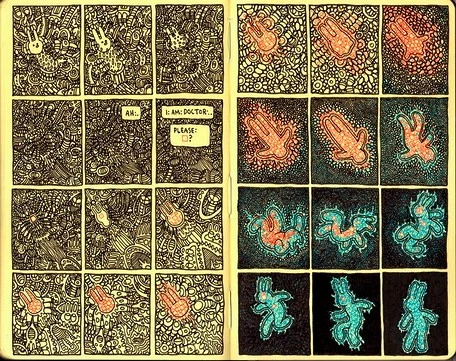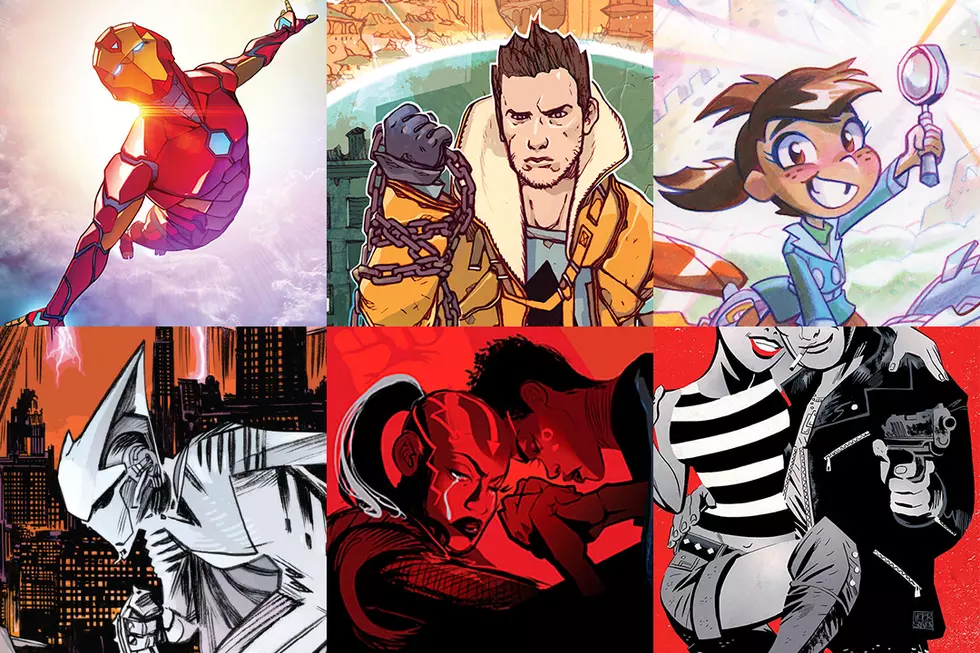
Best Comics of 2009 — ComicsAlliance’s Top 10
The end of the year is upon us, and as the old man that is 2009 hobbles towards the finish line, we're taking stock of the best comics to hit the shelves in the last 12 months. And by comics, we mean everything: superhero books, indies, manga, singles, graphic novels -- we love it all.
We know that comics aren't cheap, particularly these days, but believe us: Every single book on this list is worth your money, your time, and your heart. Just in case you aren't convinced by a simple list, ComicsAlliance writers Laura Hudson, Chris Sims, David Brothers, Eric Drumm, Caleb Goellner, Jason Michelitch, Chris Murphy, and John Parker are here to explain why these 10 books kept us glued to the page, sent us running to comic shop every Wednesday, or left our jaws on the floor. Behold: ComicsAlliance's Best Comics of 2009!
#10 Incredible Hercules (Marvel), Greg Pak, Fred Van Lente, and Various Artists
I've been singing this book's praises so much that I'm actually listed on its Wikipedia page, but the fact of the matter is that this is the best comics based on mythology have been since the heyday of Walt Simonson's run on "Thor." Over the past two years, Greg Pak, Fred Van Lente and an amazing team of artists have not only revitalized the character of Hercules himself, they've also -- and I'm just gonna come right out and say it-- given him the best teen sidekick since Jimmy Olsen with Amadeus Cho.
The interplay between the characters is based around a concept that's about as simple as you can get: The guy who's all brawn and the kid who's all brains teaming up to fight mad gods, space monsters, wicked Amazons and teenage gorgons, but it's hard not to admire how well it's pulled off, and how great both characters end up being.
And while the concepts are basic -- and in some cases, the beats of the stories are literally thousands of years old -- they've also shown how fun comics can be when they play with the boundaries of the form. "Incredible Herc" isn't just a book that combines ancient myths and modern Marvel to give the reader fight scenes with the best sound effects in comics -- although it certainly is that, and we're partial to both "CRAKAJAMMA!" and "NTUDASUNNN!" By structuring stories around the 12 Labors of Hercules while actually referencing them in the comics, and by basing Amadeus Cho's arc around Joseph Campbell's "Hero's Journey" while having him actually reading that book on-panel, they've proven that big fun fight comics can be brainy and metatextual too.
-Chris Sims

Few series this year put gravel in your guts like "Scalped." The Native American crime noir tale is gripping, sad, and makes you feel a little dirty after you read it. Centering around bad ass of the century Dash Bad Horse, a man leading a double life as a crime enforcer and undercover FBI agent, "Scalped" weaves a web of lies inside a desolate and hopeless Indian reservation.
Writer Jason Aaron ("Ghost Rider") crafts a story that has no good guys, only different levels of horrible people. From the depressing self destructive Carol Ellroy to the tragic and savage Lincoln Red Crow, each and every character is rich and believable, and R.M. Guera's art makes you practically feel the dust of the plains, and the fear, desperation and anger oozing from every page.
Every issue has so much damn personality that it completely pulls you in, and then gives you a punch to the gut. Luckily, Aaron has promised use that both he and Vertigo are committed to have the book last at least fifty issues, so there is much more to come. If you're not reading "Scalped," start now, or consider yourself kicked out of the cool kids table, because comics don't get much better than this.
-Eric Drumm

After everything Iron Man did to the Marvel Universe over the past seven years, his dramatic descent from global protector to stumbling fugitive could have been interpreted as the balancing of Karma – or even divine justice. Alienated and all but alone, Tony Stark's heart was wrecked in ways that went far beyond the sort of damage shrapnel could do. But rather than kick the repentant hero when he was down, Matt Fraction and Salvador Larroca put the Armored Avenger on the path to redemption.
And all he had to do was erase his brain.
The deceptively simple premise behind "World's Most Wanted" embodied the greatest strengths of the so-called "decompressed" storytelling that has come to be associated with modern comics, without ever slowing to the crawl that champions of done-in-one stories dread. This was a tale that more than justified a reader's nearly yearlong commitment and commanded readers' attention at every turn.
As S.H.I.E.L.D. crumbled and transformed into the new Norman Osborn-led organization H.A.M.M.E.R., Stark began to realize that even if he erased his secrets and others from every data network in the world, they could still be culled from his most personal processor – his mind. To safeguard the identities of his fellow heroes, as well as his irreplaceable repulsor technology secrets, Stark goes on the run from outpost to outpost in his outdated suits of armor, confronting his past while losing pieces of himself with every step. With the help of his few remaining allies, he finally faced a furious Osborn -- not with repulsor blasts or a clenched fist, but with the power of passive resistance.
Now at the end of his journey, a fugue and practically comatose Stark has reached out to his longtime allies to help him restore his mind. And somehow, thanks to Fraction and Larroca, readers are once again rooting for the man who had everything to get it all back.
-Caleb Goellner

After getting back from a short stay with Joshua Cotter in Chicago a few years back, everyone had the same question for me.
"Sooo... is he okay?"
Short answer, yes. In fact, he's spectacular, and may be the most interesting thing to happen to comics since (dare I say it) Chris Ware. After showing good potential with the Isotope Award-winner "Fun," and the massive critical acclaim of "Skyscrapers of the Midwest," Cotter could have done a lot of things and been considered disappointing. What does he do?
Oh, you know, keep a sketchbook. Revolutionize comics. That sort of thing.
Burned out after four years of detailed thumbnails and meticulous lines on "Skyscrapers," Cotter essentially grabbed a sketchbook and a marker and just (heh) went crazy, writing and drawing in free association. The result is this trailblazing comic/psychological journey/art object/therapy.
"Driven By Lemons" is an unintentional story of mental collapse and restructure told by abstracts and anthropomorphs alike, completely liquid. In jarringly effective ways, Cotter conveys the effects of mental illness, sleep deprivation, migraine headaches, depression, the being/no being confusion, those chemically-unbalanced shadows of self that flutter around every time you turn your head. The fiction of identity. The rebuilding process: self-creation by self-destruction. Healing. Hope. Smog of recurrence on horizon.
The simple ways in which he portrays the most complex emotions deserve their own chapter in Scott McCloud's next "Understanding" book. Cotter displays an intuitive understanding of the language of comics, shifting from base iconography to fluid cartooning, line experiments to text sections with freakish ease. The book is lovingly designed, and wants to be looked at over and over again, every inch it, every slash of ink and every pore of it.
"Driven By Lemons" is unlike any other comic experience you will ever have. It will maul you and lift you. It will infect you.
Is Joshua Cotter crazy? No. Broken antenna tuned to the subconscious? Most interesting thing to happen to comics since Chris Ware?
No pressure.
-John Parker
#6 Pluto (Viz), Naoki Urasawa

Here, easy question. Do you like a) robots, b) science fiction, c) character-driven drama, d) a murder mystery, e) Astro Boy, or f) all of the above? If you are into any of those things, you're going to like Naoki Urasawa's "Pluto."
Originally a classic "Astro Boy" tale, the reimagined "Pluto" shifts the focus from the little kid with the machine gun butt to Inspector Gesicht, one of the most advanced robots in the world. While investigating a murder, he ends up tripping over a greater conspiracy, one involving a past war, robots who can murder humans, science, and, eventually, lost memories.
For a story about robots, "Pluto" is filled with plenty of human emotion, proving that the concept of "humanity" is not reserved solely for humans. While it has its share of robots beating up other robots, the best scenes are the ones where human and robot alike communicate with other, and express what they're feeling. The character work is top notch, and Urasawa's realistic rendering means that when somebody's sad, you can really see what their emotions on their face. When a little girl is running around town, trying to help everyone she can because she's having trouble coping with her own grief, you feel it.
That's not to say that "Pluto" is a robot version of a Dr. Phil episode. When Urasawa cranks up the action, it hits the red line. "Pluto" has your recommended daily allowance of brutal fist fights, explosions, wall-running laser battles, unseen and terrifying threats, and robotic carnage.
"Pluto" is a mature comic, the sort of thing that has layers for adults to enjoy and good action for teens. It doesn't shy away from showing the after-effects of battle, either. Not the broken screws and lugnuts and oil, no-- I mean the real after-effects. Little children scarred for life by war, robots with post-traumatic stress disorder, and regrets that were born on the battlefield.
Hands down, the best manga of the year.

Ed Brubaker and Sean Phillips' pulp superhero miniseries is the story of Zack Overkill, former super-science villain, current file clerk. Zack and his twin brother Xander used to commit robbery and mass murder for the Black Death, the world's most feared supervillain. But when the Black Death was captured by the government, he put out word to destroy all evidence of his crimes, including less trustworthy accomplices. Which ends up forcing Zack and Xander into a trap that leaves Xander dead and Zack arrested, pushed into witness protection, and taking pills that remove all his superpowers.
Forced to do menial labor in an office and try to blend in with society, Zack is miserable. But when his super strength and resistance to injury return, Zack ends up using his powers to become a costumed vigilante rather than returning to his life of crime. But Zack's only beating up gang members because he can put them in a hospital and get away with it. He doesn't care about the people he saves, all he cares about is that he's strong again, unchecked by the rules of society and physics.
And that's the appeal of "Incognito." It's about being powerful, being special, being different. What people are willing to give up to rise above everyone else, what they do when they get there, and what it's like to be stuck as an ordinary person in a world where some people get to have superpowers, flying cars and laser guns.
Zack's not out for redemption, and he doesn't necessarily want to help or hurt those around him, it's just that hitting other people really, really hard is the only thing he has that makes him stand out. And discovering that again puts him on the path to, for the first time in his life, making his own decisions.
There are no real good guys in "Incognito." The men who work for the Black Death are amoral sadists who wouldn't blink an eye at committing genocide if it got them what they want. The S.O.S., the government agency fighting Black Death and forcing Zack into his new life, could also care less about the occasional use of torture and other questionable methods if the ends justify the means. Even Zack's co-workers are only interested in using him for brief moments of excitement in otherwise dreary lives.
And somehow, despite all this, you start to care about these people. You find out how they've come to be where they are and you feel for them when their lives take yet another downward turn. So many of the characters in Incognito are merely pawns in a game started long ago by players who are mostly dead and gone by now. Brubaker builds the story expertly, weaving in new characters and back story in each issue that build on what's already been presented, creating a believable world different from any superhero book you've read. And longtime collaborator Phillips' art is beautiful and is ideally suited to the pulp tones of the book.
More From ComicsAlliance
![Ironheart Shares The Sky In ‘Invincible Iron Man’ #2 [Preview]](http://townsquare.media/site/622/files/2016/11/Invincible_Iron_Man_2_Featured.jpg?w=980&q=75)




![Riri Williams Flies High In ‘Invincible Iron Man’ #1 [Preview]](http://townsquare.media/site/622/files/2016/10/Invincible_Iron_Man_1_Featured.jpg?w=980&q=75)


![Google Play’s Bubble Zoom Feature Hopes To Change How You Read Comics [SDCC 2016]](http://townsquare.media/site/622/files/2016/07/Bubble-Zoom-Featured.png?w=980&q=75)
